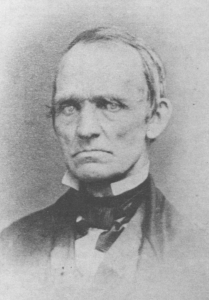
Photo info …
Credit: Public domain via Wikimedia CommonsView Source
(Oct. 29, 1792-Aug. 24, 1855). Born in Peacham, Vermont, Samuel Merrill attended Dartmouth College from 1812 to 1813, then left to teach school and study law at York, Pennsylvania. In 1816, he moved to Vevay, Indiana, where he was admitted to the bar in 1817.
Merrill represented Switzerland County in the Indiana General Assembly from 1819 to 1822. In 1822, he was elected state treasurer and moved to Corydon, then the state capital. He held this position until 1834.
After the legislature chose a new capital site, Merrill suggested the name “Indianapolis,” the city of Indiana, although the name is formally attributed to Jeremiah Sullivan. In October 1824, Merrill took 11 days to move state documents, silver from the state treasury, and a printing press from Corydon to Indianapolis. From 1834 to 1843, he served as president of the . Later he served as a partner in the trading firm Yandes and Merrill. Merrill was also president of the from 1844 to 1848 one of whose trains was the first to enter Indianapolis on October 1, 1847.
In his leisure time, Merrill compiled the third edition of the (1850). He purchased Hood and Nobles Bookstore in 1850 and began the Merrill Publishing Company, which evolved into the Bowen-Merrill Company and then the . Merrill was the founder of both the Young Men’s Literary Society and of the city’s first Athenaeum. He was an elder at the of Indianapolis and a founding member of the Fourth Presbyterian Church of Indianapolis.
As a civic leader, Merrill served as the second president of the , a leader in the Indiana Colonization Society, and an early president of the Indianapolis Temperance Society. Merrill was also a founder and trustee of Wabash College.

Help improve this entry
Contribute information, offer corrections, suggest images.
You can also recommend new entries related to this topic.

